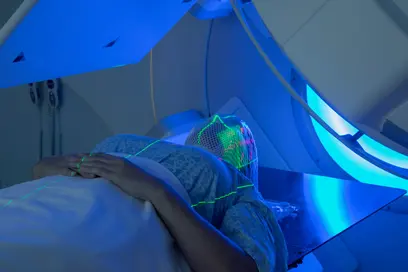The receptor protein CD95 is exposed on the surface of all cancer cells like small antennae. Activation of the receptor by the CD95 ligand (CD95L) triggers apoptosis in the cancer cell – or the exact opposite: “We studied various types of cancer tissue and found that CD95 activation usually stimulates tumor growth under natural conditions,“ remarked Ana Martin-Villalba, who has been conducting research at DKFZ on the role of CD95 for many years now. She was the first to describe the cancer-promoting effect of CD95 in glioblastomas (malignant brain tumors).
Researchers are investing considerable effort into examining how medicine could harness the other side of CD95 and cause cancer cells to die in a targeted way. To do so, Martin-Villalba and her team attempted to understand which factors decide whether CD95 activation leads to cell death or cell growth.
The team from DKFZ collaborated with Motomu Tanaka from the University of Heidelberg, jointly developing artificial cell membranes into which they could insert any amount of the CD95 ligand. Using this method, they discovered that a particular distance between the individual ligand molecules was necessary to achieve ideal activation of CD95 – and to actually induce cell death in cells isolated from biopsies of pancreatic cancer or glioblastomas grown in a petri dish.
The researchers then assumed that they had found the perfect way to cause tumor cells in the body to die and extended their experiments to brain tumors in mice. They gave the animals latex beads with the ideal surface density of CD95 ligands. However, instead of observing a reduction in the tumor mass, as expected, the opposite occurred: tumor growth was accelerated.
In order to clarify the apparent discrepancy between cell culture and animal experiments, the researchers experimented with “tumorspheres,“ tiny tumors grown in culture. CD95 activation via the artificial cell membrane stimulated growth in these cell spheroids, which behaved like natural tumor tissue.
“The impact of CD95 activation – cell death or growth – appears to depend primarily on whether there are isolated cancer cells, as grown in culture, or cells in three-dimensional structures,“ Gülce Gülcüler from Martin-Villalbas' team explained. Individual cells are programmed to die following CD95 activation. In natural conditions, however, namely in a tissue structure, CD95 activation stimulates growth. In Gülcüler's experiments, even contact to a single neighboring cell was enough to protect tumor cells from CD95-induced cell death.
“The result will enable us to develop new strategies to transform the growth-stimulating signals of CD95 into cell death signals for the cancer cells. This could help us stop tumor cells becoming resistant to treatment,“ study director Martin-Villalba added.
A clinical phase II study conducted several years ago already showed that, when combined with radiotherapy, blocking the CD95 signal could lead to better survival rates in patients with advanced glioblastomas. The study used a substance that Ana Martin-Villalba played a key role in developing. “Our current findings provide an explanation for the first time of why blocking CD95 does actually slow down cell death,“ Martin-Villalba explained.
Gülce S. Gülcüler Balta, Cornelia Monzel, Susanne Kleber, Joel Beaudouin, Emre Balta, Thomas Kaindl, Si Chen, Liang Gao, Meinolf Thiemann, Christian R. Wirtz, Yvonne Samstag, Motomu Tanaka and Ana Martin-Villalba: 3D cellular architecture modulates tyrosine kinase activity thereby switching CD95 mediated apoptosis to survival.
Cell Reports 2019, DOI: 10.1016/j.celrep.2019.10.054
Why animal experiments are vital in cancer research
Death signals or growth stimulators – up to now, scientists did not know why CD95 activation in cancer cells can have such different outcomes. As a result, they were unable to conduct further targeted research into this signaling system – so promising for cancer treatment – to benefit patients.
The different outcomes of the experiments on cancer cells grown in culture and on brain tumors in mice allowed the researchers to find the explanation for the first time. Using tumorspheres, the researchers were subsequently able to confirm the effect of cell contact in an experimental setting and rule out other influencing factors such as the immune system.
This finding will enable the therapeutic potential of blocking CD95 to be harnessed in a much more targeted way.
A picture is available for download:
CD95-activation.jpg
Picture Caption: CD95-activation in isolated cancer cells leads to apoptosis. In contrast, it is a growth stimulus for cancer cells growing in three-dimensional structures.
Note on use of images related to press releases
Use is free of charge. The German Cancer Research Center (Deutsches Krebsforschungszentrum, DKFZ) permits one-time use in the context of reporting about the topic covered in the press release. Images have to be cited as follows: “Source: G. Gülcüler/DKFZ“.
Distribution of images to third parties is not permitted unless prior consent has been obtained from DKFZ's Press Office (phone: ++49-(0)6221 42 2854, E-mail: presse@dkfz.de). Any commercial use is prohibited.



